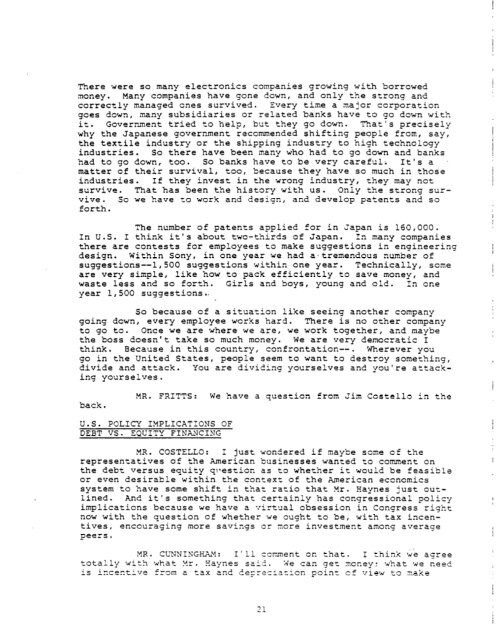Download PDF Now - LegiStorm
Download PDF Now - LegiStorm
Download PDF Now - LegiStorm
You also want an ePaper? Increase the reach of your titles
YUMPU automatically turns print PDFs into web optimized ePapers that Google loves.
There were so many electronics companies growing with borrowed<br />
money. Many companies have gone down, and only the strong and<br />
correctly managed ones survived. Every time a major corporation<br />
goes down, many subsidiaries or related banks have to qo down with<br />
it. Government tried to help, but they go down. That's precisely<br />
why the Japanese government recommended shifting people from, say,<br />
the textile industry or the shipping industry to high technology<br />
industries. So there have been many who had to go down and banks<br />
had to go down, too. So banks have to be very careful; It's a<br />
matter of their survival, too, because they have so much in those<br />
industries. If they invest in the wrong industry, they may not<br />
survive. That has been the history with us. Only the strong sur-<br />
vive. So we have to work and design, and develop patents and so<br />
forth.<br />
The number of patents applied for in Japan is 160,000.<br />
In U.S. I think it's about two-thirds of Japan. In many companies<br />
there are contests for employees to make suggestions in engineering<br />
design. Within Sony, in one year we had aatremendous number of<br />
suggestions --1,500 suggestions within one year. Technically, some<br />
are very simple, like how to pack efficiently to save money, and<br />
waste less and so forth. Girls and boys, young and old. In one<br />
year 1,500 suggestions.,<br />
So because of a situation like seeing another company<br />
going down, every employee works hard. There is no other company<br />
to go to. Once we are where we are, we work together, and maybe<br />
the boss doesn't take so much money. We are very democratic I<br />
think. Because in this country, confrontation--. Wherever you<br />
go in the United States, people seem to want to destroy something,<br />
divide and attack. You are dividing yourselves and you're attack-<br />
ing yourselves.<br />
back.<br />
MR. FRITTS: We have a question from Jim Costello in the<br />
U.S. POLICY IMPLICATIONS OF<br />
DEBT VS. EQUITY FINALVCING<br />
MR. COSTELLO: I just wondered if maybe some of the<br />
representatives of the American businesses wanted to comment on<br />
the debt versus equity qlrestion as to whether it would be feasible<br />
or even desirable within the context of the American economics<br />
system to have some shift in that ratio that Hr. Haynes just out-<br />
lined. And it's something that certainly has congressional policy<br />
implications because we have a virtual obsession in Congress right<br />
now with the question of whet-her we ought to be, with tax incen-<br />
tives, encouraging more savings or more investment among average<br />
peers.<br />
MR. CUNNINGHAY: I'11 camment on that. I think we aqree<br />
totally with what Mr. Eiaynes said. We can get money; what we need<br />
is incentive from a tax and depreciation point cf view to make


